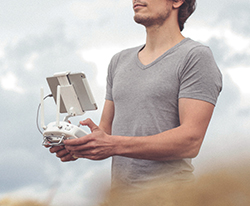So you want to hire a drone pilot for your video project. How do you make sure that you’re dealing with a professional that will deliver what you’re looking for legally and safely? Continue reading to learn the questions you should be asking your drone pilot, and learn about the must-haves for FAA regulations, insurance, and business contracts.
Federal Rules & FAA Regulations
What you’re looking for is a Part 107 certified pilot. A Part 107 certification means that the pilot has successfully passed a test to demonstrate mastery of Part 107 of Title 14 CFR (Code of Federal Regulations for the Federal Aviation Administration). A Part 107 certificate is required for any pilot that is flying drones commercially. Additionally, commercial pilots are required to retake the test every 2 years. Pilots that fly as hobbyists - meaning they aren’t making money with their drones - are not required to be Part 107 certified.
All Part 107 pilots are registered with the FAA and can be looked up in the FAA’s airman database at https://amsrvs.registry.faa.gov/airmeninquiry/
Depending on the type of work your pilot will be doing for you, they may need to have special waivers to be able to perform the project for you legally. If your project has any of the below components, then your pilot should have a separate FAA waiver for each:
- Flying drone at night
- Flying drone over people
- Flying drone from a moving vehicle
- Flying drone beyond visual line of sight
You may see some commercial drone pilots advertising that they have a 333 Exemption. Before the release of the Part 107 requirement, the FAA used to require a 333 Exemption. As of January 1, 2017, the 333 Exemption was superseded as the certification requirement for commercial drone pilots. The FAA is still releasing new drone rules on an almost annual basis, but as of mid-2019, the Part 107 certification is the requirement to fly drones commercially.
Drone pilots have rules they need to follow - but why should you care? Isn’t the drone pilot ultimately responsible for making sure they follow the rules and, if they don’t, it’s too bad for them? In most cases the answer is yes, however, if your pilot doesn’t have the proper authorizations in place with the FAA, there’s a good chance that their insurance and business contracts aren’t up to par either - and that’s where it could really start affecting you.
Questions to ask:
- When did you get your Part 107 certification and/or are you planning to renew it?
- Would you provide me with your full name and date of birth so that I can look you up in the FAA database?
- Do you have any FAA waivers?
With these questions, you will be equipped to vet your drone pilot and make sure they're as professional as you are.

